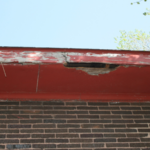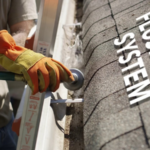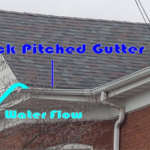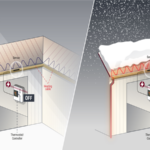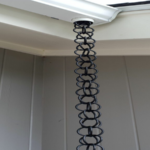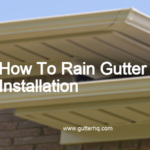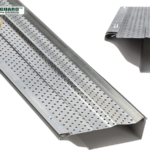If you live in Oregon, you know that the rainy season can wreak havoc on your home if you don’t have proper gutter installation. Water can damage your foundation, rot your woodwork, and even cause mold and mildew to grow inside your home. While most people think of gutters as an eyesore, they are actually an important part of your home’s exterior and should be given proper attention to ensure they are functioning properly.
- Make sure the contractor is licensed and insured. This will protect you in case of any damages that may occur during the installation process.
- Ask for references. A quality contractor should be able to provide you with a list of satisfied customers.
- Get a written estimate. This will help you compare prices and ensure you are getting a fair price for the installation.
- Make sure the contractor offers a warranty on their work. This will protect you in case of any problems that arise after the installation is complete.
- Ask if the contractor is experienced in installing gutters in Oregon. This is important because the climate in Oregon can be tough on gutters and you want to make sure your contractor knows what they are doing.
Do gutter guards work in heavy rain?
It’s a common question homeowners ask as they consider their gutter options. The answer, unfortunately, is not as straightforward as a simple yes or no. While gutter guards can be effective in some situations, there are a number of factors that can impact their performance, including the amount and intensity of rainfall.
In general, gutter guards work best in moderate rainfall conditions. They help to keep leaves and other debris out of gutters, which can clog them and lead to overflowing. This is especially beneficial in areas where trees are present, as they are more likely to shed leaves into gutters. However, in heavier rain conditions, gutter guards may not be as effective. The increased volume of water can overwhelm the guards, causing them to become saturated and allowing leaves and debris to enter the gutters. In addition, heavy rainfall can also cause water to overflow from the gutters, even if they are not clogged.
If you live in an area with moderate rainfall and are considering gutter guards, there are a number of different types to choose from. Some attach to the edge of the roof, while others sit inside the gutter. There are also a variety of materials to choose from, including plastic, metal, and foam. Ultimately, the best type of gutter guard for your home will depend on a number of factors, including the amount of rainfall you typically experience and the type of gutters you have.
Are gutters worth the investment?
There are a few things to consider when determining whether or not gutters are worth the investment. The first is the climate. If it rains a lot in your area, gutters can save you a lot of money in repairs by preventing water damage. They can also save you time by keeping your walkways and driveway clear of leaves and other debris.
Another thing to consider is the type of home you have. If you have a lot of trees around your home, gutters can prevent your home from being damaged by falling leaves and branches. Gutters can also help to prevent flooding in your basement by redirecting water away from your foundation.
In general, gutters are a good investment for most homeowners. They can save you money and time, and they can protect your home from damage.
Do you really need rain gutters?
Most houses have rain gutters, but do you really need them? The answer may depend on the climate you live in, the type of house you have, and your personal preferences.
If you live in an area with a lot of rainfall, gutters can help prevent water damage to your home. They collect the water and channel it away from your house, preventing it from seeping into your foundation or causing problems with your siding or windows.
If you have a sloped roof, gutters can also help prevent water from pooling on your roof and causing leaks. They can also help keep your basement or crawl space dry by channeling water away from your foundation.
Gutters can also be helpful in areas with a lot of snowfall. They can prevent the formation of icicles, which can be dangerous if they fall from your roof. Gutters can also help prevent your foundation from being damaged by the weight of the snow and ice.
Whether or not you need gutters may also depend on the type of house you have. If your house has a lot of eaves and overhangs, the rain may not hit the ground near your foundation, so you may not need gutters to protect your home from water damage.
Is there a class action lawsuit against LeafFilter?
Yes, there is a class action lawsuit against LeafFilter. The lawsuit alleges that LeafFilter engaged in false and misleading advertising by promising that its product would eliminate the need for gutter cleaning and maintenance. The lawsuit further alleges that LeafFilter failed to disclose that its product could become clogged with leaves and debris, and that LeafFilter did not provide adequate instructions on how to clean and maintain the product.
What is negative about gutter guards?
There are a few potential negatives to gutter guards. One is that they can be expensive to purchase and install. Another is that they may not be 100% effective at keeping debris out of gutters, meaning that some cleaning may still be required from time to time. Additionally, gutter guards can sometimes create a damming effect, causing water to back up and potentially overflow gutters.
What are the cons of rain diverting gutters?
One of the potential cons of rain diverting gutters is that they may not be as effective in areas with a lot of leaves and debris. This is because the water may not be able to flow as freely through the gutters, and as a result, may not be diverted as effectively. Another potential con is that they may be more expensive than traditional gutters. This is because they require more materials and labor to install.
What does Consumer Reports say about LeafFilter?
According to Consumer Reports, LeafFilter is the best gutter guard system on the market. It is easy to install and keeps gutters free of debris, allowing water to flow freely and preventing clogs and leaks.
How do I stop my gutters from overflowing in heavy rain?
If you have a problem with your gutters overflowing during heavy rain, there are a few things you can do to try to fix the issue. First, make sure that your gutters are clean and free of debris. This will help to ensure that water can flow freely through them. If your gutters are still overflowing, you may need to install a gutter guard or cover to help keep debris out. Finally, you may need to make sure that your downspouts are clear and unobstructed so that water can flow freely through them and away from your home.
Final Talk
If you live in Oregon, then you know that the rain can be pretty relentless at times. That’s why it’s so important to make sure that your home is properly equipped to handle all that water. One of the best ways to do that is to invest in quality gutter installation.
Gutters are an essential part of any home’s rain protection system. They help to keep water from damaging your foundation, siding, and landscaping. Not to mention, they can also help to prevent flooding in your basement or crawl space.
There are a lot of different factors to consider when choosing gutters for your home. But, if you take the time to do your research, you should be able to find a system that will work well for your needs.

